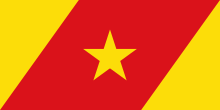Geshe (woreda)
Gishe is one of the woredas in the Amhara Region of Ethiopia. Located at the eastern edge of the Ethiopian highlands in the Semien Shewa Zone, Gishe is bordered on the south by the Menz Gera Midir, on the west and north by the Debub Wollo Zone, and on the east by Antsokiyana Gemza; the Wanchet River defines its western boundary. The name of this woreda is coming from the name of a district of the former province or kingdom of Shewa, Gishe. It contains Abuye Meda, the largest plateau in Ethiopia. The administrative center of Gishe is Rabel.
Gishe Rabel | |
|---|---|
Woreda | |
 Flag | |
| Zone | Semien Shewa |
| Region | Amhara Region |
| Area | |
| • Total | 658.78 km2 (254.36 sq mi) |
| Population (2012 est.) | |
| • Total | 66,669 |
Elevations in Gishe range from about 1200 meters along the Wanchet to over 3000 meters above sea level in the ridge of mountains that run near the eastern border of this woreda. Rivers include the Albuko, Yasha,Wayit, Kechine and Yada rivers.[2]
Demographics
Based on the 2007 national census conducted by the Central Statistical Agency of Ethiopia (CSA), this woreda has a total population of 61,521, an increase of 19.97% over the 1994 census, of whom 30,448 are men and 31,073 women; 2,774 or 4.51% are urban inhabitants. With an area of 658.78 square kilometers, Gishe Rabel has a population density of 93.39, which is less than the Zone average of 115.3 persons per square kilometer. A total of 13,691 households were counted in this woreda, resulting in an average of 4.49 persons to a household, and 13,199 housing units. The majority of the inhabitants practiced Ethiopian Orthodox Christianity, with 95.68% reporting that as their religion, while 4.01% of the population said they were Muslim.[3]
The 1994 national census reported a total population for this woreda of 51,283 in 10,715 households, of whom 25,574 were men and 25,709 were women; 1,113 or 2.17% of its population were urban dwellers. The largest ethnic group reported in Gishe Rabel was the Amhara (99.93%), and Amharic was spoken as a first language by 99.94%. The majority of the inhabitants practiced Ethiopian Orthodox Christianity, with 95.56% reporting that as their religion, while 4.26% were Muslim.[4]
Notes
- Geohive: Ethiopia Archived 2012-08-05 at the Wayback Machine
- Svein Ege, "North Shäwa 1:100,000. Topographic and administrative map of North Shäwa Zone, Amhara Region, Ethiopia."
- Census 2007 Tables: Amhara Region Archived November 14, 2010, at the Wayback Machine, Tables 2.1, 2.4, 2.5, 3.1, 3.2 and 3.4.
- 1994 Population and Housing Census of Ethiopia: Results for Amhara Region, Vol. 1, part 1 Archived November 15, 2010, at the Wayback Machine, Tables 2.1, 2.7, 2.10, 2.13, 2.17, Annex II.2 (accessed 9 April 2009)
Mekete getachew